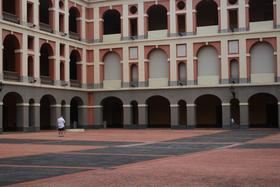Top Rankings
Barbour County Board Of Education School District ranks among the top 20% of public school district in West Virginia for:
Category
Attribute
Graduation Rate
Highest graduation rate (Top 20%)
For the 2025-26 school year, there are 6 public elementary schools serving 1,494 students in Barbour County Board Of Education School District. This district's average elementary testing ranking is 2/10, which is in the bottom 50% of public elementary schools in West Virginia.
Public Elementary Schools in Barbour County Board Of Education School District have an average math proficiency score of 30% (versus the West Virginia public elementary school average of 36%), and reading proficiency score of 32% (versus the 40% statewide average).
Minority enrollment is 4% of the student body (majority Hispanic and Black), which is less than the West Virginia public elementary school average of 12% (majority Black).
Overview
This School District
This State (WV)
# Schools
7 Schools
545 Schools
# Students
2,083 Students
171,756 Students
# Teachers
152 Teachers
13,262 Teachers
Student-Teacher Ratio
14:1
14:1
Student By Grade
District Rank
Barbour County Board Of Education School District, which is ranked within the bottom 50% of all 57 school districts in West Virginia (based off of combined math and reading proficiency testing data) for the 2022-2023 school year.
The school district's graduation rate of 92% has increased from 90-94% over five school years.
Overall District Rank
#42 out of 57 school districts
(Bottom 50%)
(Bottom 50%)
Math Test Scores (% Proficient)
29%
34%
Reading/Language Arts Test Scores (% Proficient)
34%
41%
Science Test Scores (% Proficient)
21%
28%
Graduation Rate
92%
91%
Students by Ethnicity:
Diversity Score
0.09
0.22
% American Indian
1%
n/a
% Asian
n/a
1%
% Hispanic
1%
2%
% Black
1%
4%
% White
95%
88%
% Hawaiian
n/a
n/a
% Two or more races
2%
5%
All Ethnic Groups
District Revenue and Spending
The revenue/student of $13,008 in this school district is less than the state median of $15,982. The school district revenue/student has stayed relatively flat over four school years.
The school district's spending/student of $12,293 is less than the state median of $15,156. The school district spending/student has stayed relatively flat over four school years.
Total Revenue
$27 MM
$3,933 MM
Spending
$26 MM
$3,730 MM
Revenue / Student
$13,008
$15,982
Spending / Student
$12,293
$15,156
Best Barbour County Board Of Education School District Public Elementary Schools (2025-26)
School
(Math and Reading Proficiency)
(Math and Reading Proficiency)
Location
Quick Facts
Rank: #11.
Junior Elementary School
(Math: 60-69% | Reading: 50-59%)
Rank:
Rank:
10/
Top 10%10
49 West 1st Street
Junior, WV 26275
(304) 823-1200
Junior, WV 26275
(304) 823-1200
Gr: PK-4 | 106 students Student-teacher ratio: 12:1 Minority enrollment: 1%
Rank: #22.
Belington Middle School
(Math: 33% | Reading: 41%)
Rank:
Rank:
5/
Bottom 50%10
469 Morgantown Pike
Belington, WV 26250
(303) 823-1281
Belington, WV 26250
(303) 823-1281
Gr: 5-8 | 267 students Student-teacher ratio: 13:1 Minority enrollment: 2%
Rank: #33.
Philippi Elementary School
(Math: 40-44% | Reading: 30-34%)
Rank:
Rank:
5/
Bottom 50%10
547 Cherry Hill Rd
Philippi, WV 26416
(304) 457-4229
Philippi, WV 26416
(304) 457-4229
Gr: PK-4 | 394 students Student-teacher ratio: 17:1 Minority enrollment: 7%
Rank: #44.
Belington Elementary School
(Math: 40-44% | Reading: 25-29%)
Rank:
Rank:
4/
Bottom 50%10
471 Morgantown Pike
Belington, WV 26250
(304) 823-1411
Belington, WV 26250
(304) 823-1411
Gr: PK-4 | 291 students Student-teacher ratio: 13:1 Minority enrollment: 3%
Rank: #55.
Kasson Elementary/middle School
(Math: 30-34% | Reading: 30-34%)
Rank:
Rank:
3/
Bottom 50%10
19 Kasson Rd
Moatsville, WV 26405
(304) 457-1485
Moatsville, WV 26405
(304) 457-1485
Gr: PK-8 | 165 students Student-teacher ratio: 12:1 Minority enrollment: 3%
Rank: #66.
Philippi Middle School
(Math: 14% | Reading: 23%)
Rank:
Rank:
1/
Bottom 50%10
611 Cherry Hill Rd
Philippi, WV 26416
(304) 457-2999
Philippi, WV 26416
(304) 457-2999
Gr: 5-8 | 271 students Student-teacher ratio: 12:1 Minority enrollment: 6%
Recent Articles

How Public Schools Support Students on Free / Reduced-Lunch Programs
Explore how U.S. public schools support students eligible for free or reduced-price lunch through nutrition, academic, and wraparound services in 2025.

Hidden Costs of Public Schools: Fees, Supplies & Extras
Explore the hidden costs in public schools—fees, supplies, extracurriculars—and how parents can plan for them in 2025.

Public School Funding 2025: What Families Should Know
Essential insights on public school funding in 2025—how it works, what’s changing, and what families should know to stay ahead.




